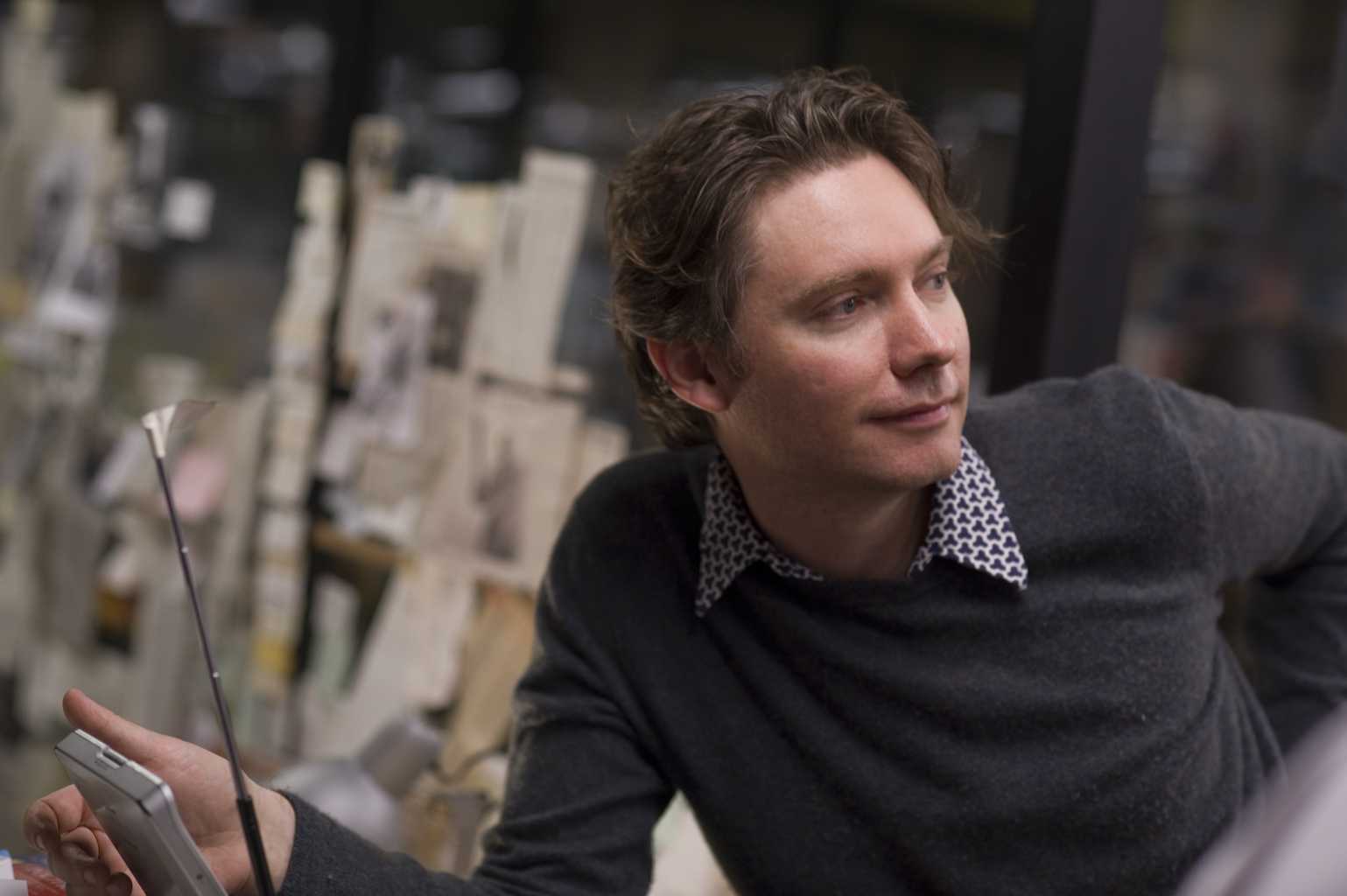
On this edition of INTERVUE, director Kevin MacDonald has taken us to the bottom of the sea in search for lost treasure in his latest thriller “Black Sea”. The Focus Features movie stars Jude Law and Scoot McNairy and opens in theaters TODAY.
I heard that the inspiration for the film was based on the Kursk disaster. Is that correct?
Yes, that’s a famous submarine disaster, infamous submarine disaster that happened in the year 2000 where a Russian sub went down in the Barents Sea. There was an explosion and a lot of people died instantly but some people survived and they survived for several days in one of the chambers of the sub. They were tapping out messages to the people up above but the people up above couldn’t rescue them because they were too deep. They all perished and I thought “That’s a horrible scenario when you got evil trapped at the bottom of the ocean. Maybe, what if they’re not navy people what if they were somewhere where they shouldn’t be and maybe they are looking for treasure. That’s where the story came from.
It’s a good scenario for a film since it’s never been done before. They are sub films out there like “The Hunt for Red October”. I wonder were some of those films inspired you to make this one.
I always like submarine movies because there’s something about the claustrophobia, it makes it so tense. Also, it gives this man v. nature element of it. Submarines are machines that take people into space effectively because deep under is kind of like space. So, they are like spaceships in someway. They are taking you to a place where you otherwise could not survive. Nature’s too ferocious outside the submarine, you couldn’t survive. Something about that quality and the loneliness of being trapped on the bottom of the ocean with no way out, gives me chills thinking about it. I figured that something that gives you the chills makes a good thriller.
Walk us through the casting of Black Sea. We have Jude Law, Scott McNairy, and some Russian actors involved in this project, correct?
Yes, its very much kind of like an ensemble piece. A lot of the characters are equally important. Then, there’s Jude Law in the lead role, which ineffective is playing someone totally different from what we are used to.
Yes, we usually see him as the nice handsome guy but he’s gruff and gritty in this film.
Yes, he’s really rough, gritty, masculine and authoritative. He put on a little weight and muscle for the role. He shaved his head and lowered his voice. He’s got this Scottish accent. He’s very different from the Jude Law you have in your head. That’s one of the things we wanted to achieve because early on you’re watching the movie and you’re thinking, “Is that Jude Law? No, it can’t be.” Then you forget its him. I wanted to become a character actor in a way.
One of things that was so much fun in the movie was casting real Russians as the Russian crew. We have five or six Russian characters and they are all well-known Russian actors. They are people we don’t know of because they don’t really speak much English. One of the actors, the younger guy Grigory, you may have seen in “A Most Wanted Man” with Philip Seymour Hoffman. I think that he will have an international career but the rest of them are the biggest stars in Russia but they don’t do films outside because they don’t speak English but in this film, they didn’t really need to speak English. One of the actors won the Silver Bear award in Berlin, three years ago for doing a Russian film.
They came on to do these relatively small parts because it’s a Western film but one where they can speak Russian. It’s also where they don’t get to play the kind of James Bond villain. When American companies come to them, they are like “Will you destroy the American financial system?” or “Are you a reconstructed KGB agent who wants to take over the world?” They don’t necessarily want to do that because they are serious actors.
From what I outstand that part of the film was shot onboard a Russian submarine while some shot on a set. Can you tell us about that experience?
When we were researching the movie, I should say first of all, that in the story, this ragtag bunch of ex-sailors they wanted to go search for treasure in the Black Sea. Its somewhere in this feet of water where no one’s meant to go. They bribed a Ukrainian Admiral to give them this old sub. They take this terrible decaying rusting vessel for the port, under the Russian fleet. When we writing it, we found a real Russian sub, a vintage 1964 Black Widow, which was weirdly owned by a private guy who bought it in the early 1990s. He bought for $100,000 when the Russian Navy was selling off everything since it was the end of the Cold War.
When he bought, he tried to turn it into a tourist attraction but it hadn’t worked. So, this submarine has been sitting there outside of London, just North of the Thames River. When we saw it, we were sort of amazed by it. We did the first two weeks of filming on the submarine and that was all the cast got to experience what its really like on the submarine. I felt that they brought their experience to their performances.
I like to delve deep into that. Was there any type of training you put the actors through prior to filming?
All the actors had a week rehearsal and we had given them submarine lessons. We had two ex-submariners come in and give them lectures on principles of how submarines work, how submariners behave. They also took every actor aside and informed them of their assigned duties. Jude even went further then that. He went on an actual submarine for four to five days underwater. He slept in a room with eighteen men. It’s a pretty unforgiving environment but he was hilarious talking about it. The thing that made the biggest impression on him was the smell when they first opened the hatch. He went “I couldn’t believe that smell.” It smelled like rotten vegetables, old sweat and diesel oil. Within two hours, he didn’t even notice it anymore.
When it comes to filming in a submarine, there are a lot of aesthetic choices. Now, did they work for or against you?
I feel that there are pro and there are cons. It is definitely difficult to film in a submarine because it’s so small and so difficult to move around. You know it’s hard to move the camera. There’s nowhere for the actors to stand because there is pretty much corridors on a submarine. Nowadays, they are a bit wider. This one’s really crowded; it’s like a corridor with a series of room cupboards off to the side.
You have been directing for over 20 years from feature films to documentaries. Is there one form you prefer over the other?
I try to alternate between the doing the two but I like them both. It really depends on your kind of mood. You know, once you done a fiction film you desperately want to get back to real life and not deal with studios and actors. To get back, make something and talk to real people and learning about things. I like that. After that, you’re ready to go back and make entertainment, make fiction. Enjoy this craft element that you get to play in it.
What’s next?
I’m making a documentary about a Chinese artist who blow things up for a living. He does some artwork that is often connected to fireworks, explosives. He did the fireworks ceremony at the Beijing Olympics. Then, I am working on a couple new feature projects.
Thanks Kevin for the interview. Check out “Black Sea” IN THEATRES TODAY



